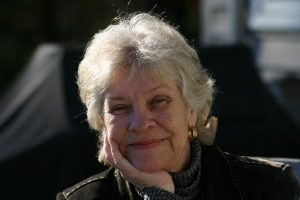MacLachlan, Patricia
 Patricia MacLachlan was born in Wyoming, and to this day carries a small bag of prairie dirt with her wherever she goes to remind her of what she knew first. She is the author of many beloved books for young readers and picture books for children. The author lives and works in western Massachusetts.
Patricia MacLachlan was born in Wyoming, and to this day carries a small bag of prairie dirt with her wherever she goes to remind her of what she knew first. She is the author of many beloved books for young readers and picture books for children. The author lives and works in western Massachusetts.
Questions & Answers With Patricia MacLachlan
Have you written all your life, and what experiences have helped to direct your writing? Was there someone in your life who encouraged you to write your first novel?
- I have written since I was a child, but mostly in private. I wrote a lot of fiction in my diary, believe me. I decided that my life was not very exciting, so I made it exciting there. I invented a great life for myself. I was always a great reader, and my parents read constantly. My father also acted out books with me, over and over again. That is where I learned character and plot.
The Witting family members in Sarah, Plain, and Tall, Skylark, and Caleb’s Story demonstrate strong familial ties and loyalty. Have personal relationships in your own family inspired these characters? How?
- I think all my books are about family. Families fascinate me – how they work or don’t work; how the members affect each other. I have a wonderful family, and I have a great husband and three great children who have given me so many ideas for books.
There is a certain simplicity in the Witting family’s lifestyle on the prairie. What do you think urban children can gain from reading your books?
- I think that the language of the prairie is spare – it goes with the landscape. Urban children can see this – how the characters and setting go together. Children always want to learn about people from other places. And the truth of it is, we are more alike than different, and that is powerful for children to know.
In Caleb’s Story, when Caleb discovers that his grandfather cannot read or write, he decides to help teach him rather than to act out in shame or embarrassment. His choice has an important message for literacy concerns. Do you actively campaign for literacy, and would you want this book used as such?
- I do actively campaign for literacy. Literacy is far more than learning to read – it is how to think and make decisions. I truly hope that Caleb’s Story is used to further literacy issues. And it makes me happy, always, when a child like Caleb teaches an adult – the least powerful teaching the more powerful.
How do you share you love of writing with your family and friends?
- My husband and I have always been readers. And now our children are readers and writers. One son works in publishing; another works in Africa but has done photographs for a book; another is writing books with me.
You have experience playing the cello in a chamber music group. What is the interplay between the creative expression of writing and playing music? How do they inspire each other?
- Writing and playing music are forms of expression, but very different in process. Music has always renewed me. I think that is the role of music. Music tells a story, just as writing attempts to do so. Both forms take practice. The more you write, the more experience allows you to tell a story, just as practicing makes a better musician.
– Courtesy of HarperCollins Publishers
Click here for titles available in the BTSB Bookstore from this author
